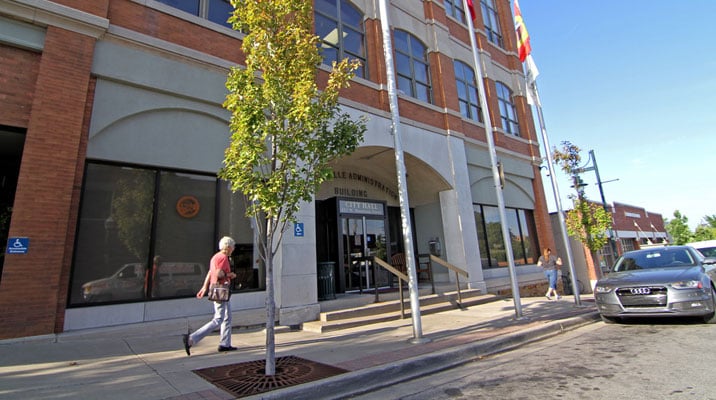
File photo
A change to Fayetteville code allows all residents who are legally authorized to live or work in the United States to volunteer on some advisory boards. Previously, the law required volunteers to be registered voters.
The decision was made Tuesday by the City Council, who voted unanimously to approve the proposal sponsored by Ward 4 Council Member Kyle Smith.
Smith said the goal is to attract a more diverse group of candidates, and that the idea came from the Welcoming Fayetteville Plan, which the council approved in 2017. The plan recommends, among other things, that the city encourage civic engagement for new Americans who wish to participate in boards, committees, commissions.
Some of the advisory panels include the Active Transportation Advisory Committee, the Environmental Action Committee, the Fayetteville Arts Council and the Urban Forestry Advisory Board (see a full list of boards, committees and commissions here). Some panels still require voter registration, including the Civil Service Commission, Energy Improvement District #1, Fayetteville Public Library Board of Trustees, Historic District Commission, Northwest Arkansas Regional Airport Authority and the Planning Commission.
It was the second time the council discussed the issue after it was first introduced last month. An initial draft proposed allowing any noncitizen to serve in an advisory role, but the City Attorney’s office recommended a different approach.
Assistant City Attorney Blake Pennington said the state’s recently adopted “sanctuary cities” statute prohibits cities from passing laws that give illegal immigrants the right to “lawful presence or status.” Since those terms aren’t defined, Attorney General Leslie Rutledge would have full discretion to rule whether Fayetteville was in violation of the statute. And while Pennington said Fayetteville would likely win a battle over the statute in federal court, the state would have the right to withhold up to $6 million in discretionary funding it provides to the city during the appeal process.
Pennington suggested the council amend the ordinance instead of running the risk of violating the statute. He recommended the amendment state that all city residents who are legally authorized to live or work in the United States (including immigrants with a temporary visa or work permit, exchange students, DACA recipients, green card holders, etc.) be eligible to serve on the advisory boards instead of using language that allows all noncitizens.
The council agreed, and unanimously passed the amendment.
Nearly a dozen residents spoke in favor of the ordinance during public comment on Tuesday. Many said that just because someone isn’t a citizen, it doesn’t mean they aren’t capable of presenting good ideas to the City Council for consideration. Having more diversity among the people who make recommendations to the council, they said, could only be a good thing for Fayetteville, and that it could also help fill some of the vacancies on those boards.
Three people who spoke said they didn’t like the ordinance at all, and insisted that only U.S. citizens should be allowed to serve.
Steve Clark, president of the Chamber of Commerce, said he’s also against the ordinance. He said the council should instead look at ways to get more participation to fill board vacancies. He said anyone who wants to speak to the council can always come to council meetings and speak at the microphone.
Smith said speaking at council meetings is often the microphone of last resort when it comes to making recommendations, and that the goal is to have more diversity at a much earlier point in the policy-making process. He also reminded the audience that the boards the council is talking about are not policy-making bodies, but rather groups that make suggestions to the actual lawmakers.
Before the vote, Mayor Jordan thanked Smith for bringing the proposal forward.
He said while he was a City Council member, he voted in 2001 for the ordinance that requires advisory volunteers to be registered voters. Since then, he said, he’s had a change of heart.
“We want all our residents to know they are welcome in Fayetteville,” Jordan said. “This item helps remove barriers and encourages city engagement from residents who may not yet be citizens but who are legally allowed to live or work here.”

